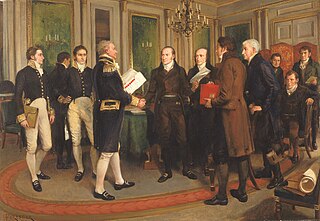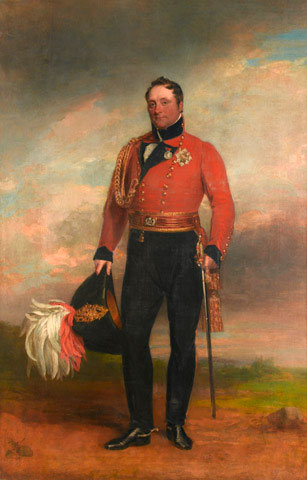Related Research Articles

The War of 1812 was fought by the United States and its allies against the United Kingdom and its allies in North America. It began when the United States declared war on Britain on 18 June 1812. Although peace terms were agreed upon in the December 1814 Treaty of Ghent, the war did not officially end until the peace treaty was ratified by the United States Congress on 17 February 1815.

The 1810s was a decade of the Gregorian calendar that began on January 1, 1810, and ended on December 31, 1819.

1814 (MDCCCXIV) was a common year starting on Saturday of the Gregorian calendar and a common year starting on Thursday of the Julian calendar, the 1814th year of the Common Era (CE) and Anno Domini (AD) designations, the 814th year of the 2nd millennium, the 14th year of the 19th century, and the 5th year of the 1810s decade. As of the start of 1814, the Gregorian calendar was 12 days ahead of the Julian calendar, which remained in localized use until 1923.

The Treaty of Ghent was the peace treaty that ended the War of 1812 between the United States and the United Kingdom. It took effect in February 1815. Both sides signed it on December 24, 1814, in the city of Ghent, United Netherlands. The treaty restored relations between the two parties to status quo ante bellum by restoring the pre-war borders of June 1812. Both sides were eager to end the war. It ended when the treaty arrived in Washington and was immediately ratified unanimously by the United States Senate and exchanged with British officials the next day.

Duke of Wellington is a title in the Peerage of the United Kingdom. The name derived from Wellington in Somerset. The title was created in 1814 for Arthur Wellesley, 1st Marquess of Wellington, the Anglo-Irish military commander who is best known for leading the decisive victory with Field Marshal von Blücher over Napoleon's forces at Waterloo in Brabant. Wellesley later served twice as British prime minister.

General Sir Gordon Drummond, GCB was a Canadian-born British Army officer and the first official to command the military and the civil government of Canada. As Lieutenant Governor of Upper Canada, Drummond distinguished himself on the Niagara front in the War of 1812 and later became Governor-General and Administrator of Canada.

General Rowland Hill, 1st Viscount Hill, was a British Army officer and English aristocrat who served in the Napoleonic Wars as a brigade, division and corps commander. He became Commander-in-Chief of the British Army in 1828. Well-liked by the soldiers he commanded, he was known as "Daddy Hill".

The Battle of Chippawa, also known as the Battle of Chippewa, was a victory for the United States Army in the War of 1812, during its invasion on July 5, 1814, of the British Empire's colony of Upper Canada along the Niagara River. This battle and the subsequent Battle of Lundy's Lane demonstrated that trained American troops could hold their own against British regulars. The battlefield is preserved as a National Historic Site of Canada.
Baron Beresford is a title that was created three times for the Beresford family, one in the Peerage of Ireland and later also two in the Peerage of the United Kingdom. In all instances it was created for men who were eminent politicians or soldiers. The first creation still exists as a subsidiary title, but the latter two became extinct at the death of their original holder.

Field Marshal Stapleton Cotton, 1st Viscount Combermere, was a British Army officer, diplomat and politician. As a junior officer, he took part in the Flanders Campaign, in the Fourth Anglo-Mysore War and in the suppression of Robert Emmet's insurrection in 1803. He commanded a cavalry brigade in Sir Arthur Wellesley's Army before being given overall command of the cavalry in the latter stages of the Peninsular War. He went on to be Commander-in-Chief, Ireland and then Commander-in-Chief, India. In the latter role he stormed Bharatpur—a fort which previously had been deemed impregnable.
Events from the year 1828 in the United Kingdom.

The following is a synopsis of the land campaigns of the War of 1812.

Events from the year 1815 in the United Kingdom. 1815 marks the end of years of war between the United Kingdom and France when the Duke of Wellington wins a decisive victory over Napoleon at the Battle of Waterloo. Fighting in the War of 1812 between the UK and the United States also ceases, peace terms having been agreed at the end of 1814. The year also sees the introduction of the Corn Laws which protect British land owners from cheaper foreign imports of corn.
Events from the year 1809 in the United Kingdom.
Events from the year 1812 in the United Kingdom. The United Kingdom is still involved in the Napoleonic Wars with France and its attempts to stop French trade lead to the War of 1812 with the United States. Lord Wellington is active in the Peninsular War in Spain. This year also marks the only assassination of a British prime minister when Spencer Perceval is shot.
Events from the year 1813 in the United Kingdom.
Events from the year 1818 in the United Kingdom.
Events from the year 1822 in the United Kingdom.

The Allied sovereigns' visit to England occurred in June 1814 to celebrate the peace following the defeat of France and abdication of Napoleon Bonaparte in April 1814. The sovereigns and generals of the Coalition Allies – comprising Austria, Prussia, Russia, Sweden, the United Kingdom, and a number of German States – took part in a state visit and various peace celebrations in London before progressing to the Congress of Vienna later that year. It is also occasionally known as the Congress of London, although most diplomatic discussions were deferred until Vienna.
Events from the year 1814 in the United States.
References
- 1 2 3 4 5 Palmer, Alan; Palmer, Veronica (1992). The Chronology of British History. London: Century Ltd. pp. 246–247. ISBN 0-7126-5616-2.
- ↑ "SV Queen". wrecksite. 25 April 2016. Retrieved 26 November 2016.
- ↑ Hadley Centre Ranked Central England temperature.
- 1 2 3 4 Penguin Pocket On This Day. Penguin Reference Library. 2006. ISBN 0-14-102715-0.
- ↑ Weinreb, Ben; Hibbert, Christopher (1995). The London Encyclopaedia. Macmillan. p. 287. ISBN 0-333-57688-8.
- ↑ Higman, Chris (March 2014), "The Gas Light and Coke Company" (PDF), 200 Years of Commercial Gas Production, p. 5, archived from the original (PDF) on 21 May 2014, retrieved 20 May 2014
- ↑ "Gas Light and Coke Co". Grace's Guide. 16 May 2014. Retrieved 20 May 2014.
- ↑ Maycock, R. J.; Silsbury, R. (2005). The Piers, Tramways and Railways at Ryde. Usk: Oakwood Press. p. 13. ISBN 0-85361-636-1.
- ↑ History of a Six Weeks' Tour .
- ↑ The Times 9395 1814-12-19 p.3A.
- ↑ "Sovereign - 1814". On the Rocks. Maritime Museum of the Atlantic. 5 October 2007. Retrieved 17 May 2021.
- ↑ Jones, Neal T., ed. (1984). A Book of Days for the Literary Year . London; New York: Thames and Hudson. ISBN 0-500-01332-2.
- ↑ Cox, Michael, ed. (2004). The Concise Oxford Chronology of English Literature . Oxford University Press. ISBN 0-19-860634-6.